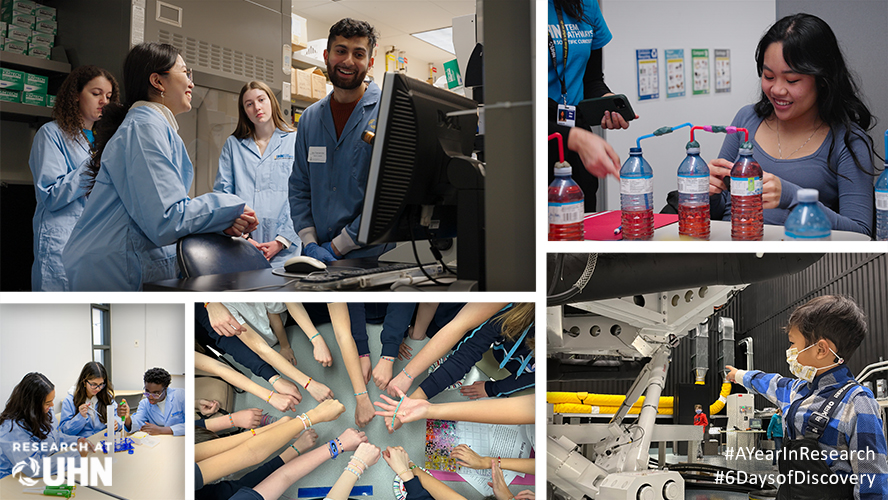
UHN is shaping the future of health research by supporting the next generation of researchers. Through initiatives like UHN STEM Pathways, the Office of Research Trainees (ORT), and the UHN Postdoc Association (UHNPA), UHN fosters a passion for science while providing essential support and resources to empower future health care changemakers.
Igniting Scientific Curiosity and Empowering Future Researchers
The UHN STEM Pathways outreach program has facilitated over 15,000 interactions with youth globally, sparking interest in STEM (science, technology, engineering, and mathematics) through initiatives like STEM Exploration, Summer Research Internships, Lab Tours and STEM Workshops. This program offers direct engagement with UHN researchers, providing valuable insight into real-world applications of science and inspiring future careers in research. Learn more about the initiative through their recent Program Update.
A key collaboration between STEM Pathways and the ORT, the Pathways to Research program lowers barriers for students from underrepresented backgrounds to participate in summer research at UHN. Supported by UHN’s Research IDEA (Inclusion, Diversity, Equity, and Accessibility) Committee, this initiative helps create a more innovative research environment by expanding opportunities for diverse students.
The ORT plays a crucial role in supporting over 2,000 research trainees (e.g., graduate and undergraduate students) and postdoctoral researchers across UHN. It serves as a central hub for important resources, skills training, and professional development, helping these emerging scientists explore diverse career paths and reach their full potential. UHN's commitment to its postdoctoral researchers was demonstrated through the establishment of a new minimum salary in 2023 with annual salary increases, striving toward financial support that better reflects their contributions to research. Its commitment to its trainees is exemplified through initiatives like the Summer Training and Research (STAR) Program which supports the mentorship and development of prospective research students.
Through UHNPA, postdoctoral researchers are also encouraged and supported to lead initiatives, foster career growth, and network with peers and professionals, while building a collaborative community that empowers their development as future health care leaders.
Leading Health Innovation
UHN’s research excellence is deeply intertwined with the contributions of its trainees and postdoctoral researchers. At Toronto General Hospital Research Institute, the Multi-Organ Transplant Student Research Training Program is training students in the foundations of clinical research and enabling trainees to make contributions to improving care for heart transplant patients at risk of kidney disease, demonstrating the immediate impact of trainee-led research.
Similarly, researchers at The Institute for Education Research are addressing critical challenges faced by medical students during the COVID-19 pandemic, providing essential administrative and personalized support to future health care professionals as they navigate times of crisis.
Looking to the Future
By investing in the next generation of researchers, UHN is not only driving meaningful change but also laying the foundation for a vibrant, innovative future in health research. With a focus on inclusivity and support, we aim to create an ecosystem where emerging scientists can thrive, collaborate, and ultimately transform global health care for generations to come. These efforts ensure that tomorrow’s leaders are equipped to make lasting contributions to health care and scientific discovery.
This story is a part of our 2024 Year In Research campaign. Check out more feature stories here.




